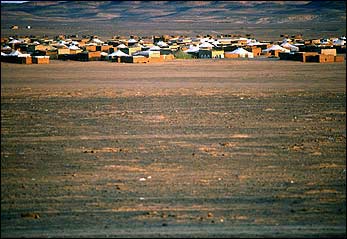Ringing the changes for Western Sahara's exiles
Ringing the changes for Western Sahara's exiles

TINDOUF, Algeria, Jan 14 (UNHCR) - A new talking point has emerged among refugees in western Algeria as the UN establishes a telephone link with their homeland in Western Sahara.
After almost 30 years of isolation, Western Saharan refugees in remote desert camps in Tindouf, western Algeria, can now call their relatives back home free of charge. The first segment of a UNHCR phone service began operating on Monday between Tindouf's 27 February school and Western Sahara's Laayoune city.
More than 50 calls were made in the first two days - 80 percent of them by women.
Originally started last April, with the assistance of MINURSO (the UN Mission for the Referendum in Western Sahara), the phone connection was suspended after one day at the request of Saharan (Polisario) representatives pending formal authorisation by the Algerian authorities. However, following a series of meetings in October and December between the Special Representative of the Secretary-General, Álvaro de Soto, senior UNHCR staff and representatives of the Algerian and Moroccan governments as well as the Polisario, the necessary agreements and authorisation were finally received.
With the resumption of services, there are plans to gradually extend the connection to the other camps in the Tindouf region.
"The phone line will bring together families separated by this long-standing conflict and allow them to get closer," said Radhouane Nouicer, Deputy Director of UNHCR's Bureau for Central Asia, South-West Asia, North Africa and the Middle East, which oversees operations in Western Sahara. "It is a real humanitarian advance after so many years."
The phone links are the first element in a package of measures intended to build confidence among the 165,000 Western Saharan refugees, or Saharawis, estimated by the Algerian government to be living in five camps around Tindouf.
UNHCR is also negotiating the start of a mail service as soon as possible. The agency has stressed that for this service to work as a confidence-building measure, the agency would need unhindered access to the beneficiaries and assurances as to the confidentiality of the mail and the neutrality of the operating service.
The refugee agency also hopes to start family visits in February, using UN aircraft to shuttle people between the Tindouf camps and Western Sahara on a limited basis.
UNHCR first began discussing this package of confidence-building measures (which also includes proposals for seminars and information campaigns) - with the full support of the UN Security Council - in 1999.
"It's taken five years, but when you hear of the enormous pleasure it has brought to those who have been making calls so far, it makes you glad that the UN persevered," said UNHCR's Nouicer.

The Saharawis started fleeing to Algeria in 1975, when Morocco took control of the mineral-rich desert region after Spain abandoned it. A 15-year war ensued between the Moroccan government and the Polisario Front. The UN negotiated a cease-fire agreement in 1991, but has so far been unable to get the parties to decide the political future of the disputed territory.
Plans for voluntary repatriation have been repeatedly put on hold in view of the continuing political deadlock over Western Sahara.
Meanwhile, the Saharawi exiles continue languishing in Algeria's camps. UNHCR and its partners provide water, health care, education, food aid and other basic services in the camps, but face repeated funding and assistance problems for these forgotten refugees. The refugee agency plans to conduct a joint assessment mission to the camps with the World Food Programme and donor countries at the end of January to highlight the refugees' urgent humanitarian needs.








